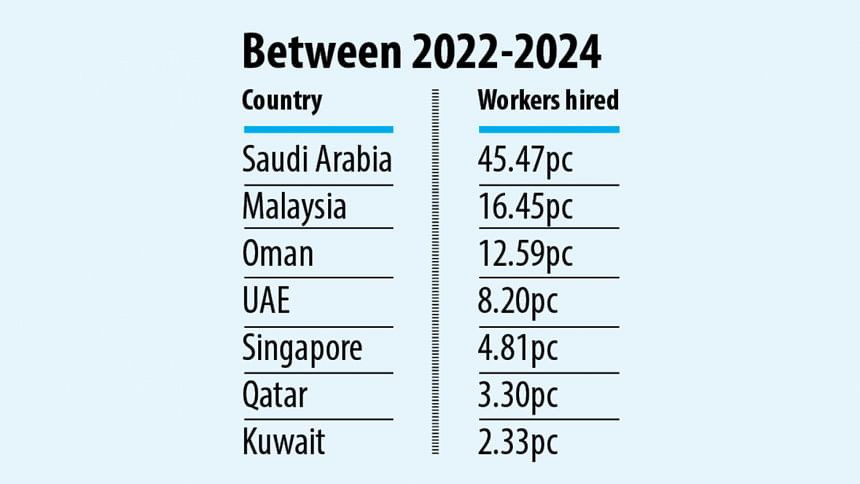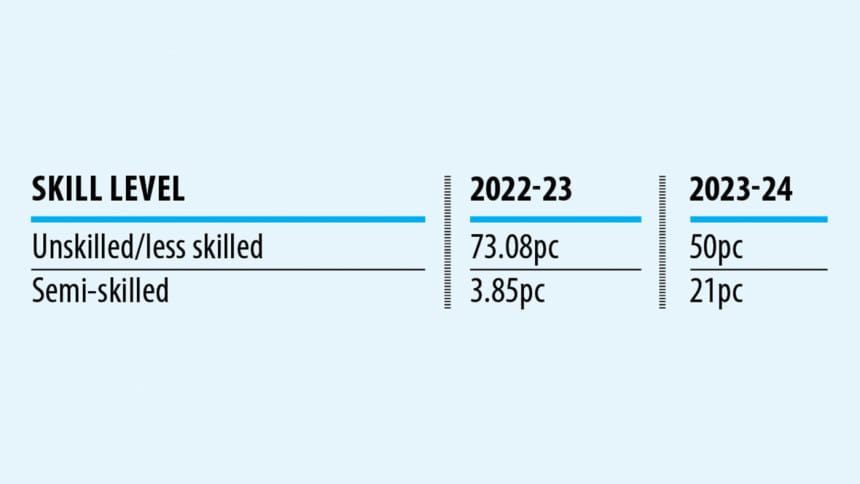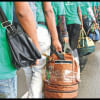Lack of skill traps migrants in limited job market

Md Hasan travelled overnight from his home district Barguna to the capital city recently for biometric data enrollment at the Visa Service Centre for Saudi Arabia, hoping to secure a low-paid job in the Kingdom.
The 26-year-old man, who studied up to ninth grade, said he was trying for a job abroad for quite a while, and his family also supported the cause because of his unemployment status.
"I want to go abroad to try and secure a better life for my family," Hasan said.
Like him, hundreds of thousands of Bangladeshi youth consider jobs abroad as a better option to change their fortune amid lack of employment opportunities at home.

However, when it comes to the migration of Bangladeshi workers to foreign lands, the overseas job market remains largely limited to a few countries in two specific regions --Middle East and Southeast Asia.
While the government maintains a list of 168 countries for migration of workers, on paper, most migrants only get the opportunity to migrate to the countries of these two regions.
Shariful Hasan, head of BRAC Migration Programme, said countries in the Middle East and Southeast Asia recruit mostly unskilled workers from Bangladesh, while countries like those in Europe and Japan in Asia demand workers with specialised skills, including language proficiency.
"As such, lack of skilled workers remains a major obstacle for Bangladesh to expand its overseas job market beyond Middle East and Southeast Asia," said Shariful.
Contacted, Md Ruhul Amin, secretary of the Expatriates' Welfare and Overseas Employment Ministry, recently said they have been giving priority to the migration of skilled workers.
Besides, the ministry has been working to reopen overseas markets that are currently suspended for Bangladeshi workers, he said.
In last two years, Bangladesh has sent over 24 lakh workers abroad. However, more than 93 percent of them were hired by five countries in the Gulf and two in Southeast Asia, according to Bureau of Manpower, Employment and Training (BMET).
Of the seven countries, Saudi Arabia hired 45.47 percent of the workers, followed by Malaysia (16.45 percent), Oman (12.59 percent), the United Arab Emirates (8.20 percent), Singapore (4.81 percent), Qatar (3.30 percent), and Kuwait (2.33 percent).
Among the 13.05 lakh workers sent abroad last year, 50 percent were less skilled and 21 percent were semi-skilled, according to a report by Refugee and Migratory Movements Research Unit.
Over 11 lakh workers migrated in 2022, including 73.08 percent less-skilled and 3.85 percent semi-skilled, the report adds.
A total of 1.25 crore workers have migrated from Bangladesh since 2004, of which nearly 87 percent were recruited in the aforementioned seven countries, with Saudi Arabia alone intaking 38 lakh workers, according to BMET.
Jordan, Lebanon, and Bahrain hired 2.14 lakh, 2.67 lakh, and 3.13 lakh workers, respectively, during this time, shows BMET data.
Besides, Maldives hired around 1.30-1.40 lakh workers from Bangladesh in the past 15 years, said an official at the Bangladesh mission there.
There are at least another 10 countries, including South Korea, Brunei, Italy, and Japan, that are regular destinations for Bangladeshi workers, however, none of them have hired even one lakh workers in two decades.
Shariful said issues like sending more skilled workers abroad, searching for new labour markets, and reducing migration costs dominated discussions in the labour migration sector over the past two decades, but "no solution has been found yet."
To explore new markets, the expatriates' welfare ministry has conducted several studies in past four years.
A study on "Employment opportunities for Bangladeshi less-skilled, semi-skilled and skilled migrant workers in East European countries" reveals huge opportunities for Bangladeshi workers in East European countries in several major sectors, including construction, hotels and restaurants, shops and commercial centres, tourism, driving, garments, public health, and airlines.
The study mentions high and attractive wage structures, health allowances, public health facilities, and easy access to remit money as some of the prospects of the job market.
However, there are challenges, including lack of awareness of specific government services for migrants, high migration costs, language barriers, and cultural differences, the report also says.
Shariful of Brac said whenever a major market suspended intaking workers, Bangladesh's overall labour migration declined, recommending upskilling workers to harness untapped overseas job markets beyond the existing ones.
Syed Saiful Haque, chairman of Warbe Development Foundation, said Bangladesh missions in different countries can play an effective role in "branding" Bangladeshi workers and exploring new markets by engaging with the private sectors of those countries.

 For all latest news, follow The Daily Star's Google News channel.
For all latest news, follow The Daily Star's Google News channel. 









Comments